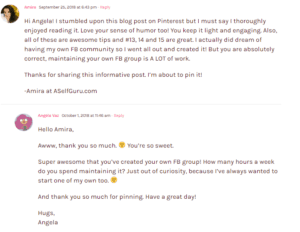So you’ve started a new blog, published several epic blog posts, set up your social media profiles, but you’re struggling in your quest to generate backlinks.
Let’s stop here for a sec and explain what backlinks are:
In search engine optimization (SEO) terminology a backlink is a hyperlink that links from a Web page, back to your own Web page or blog. Also called an Inbound Link (IBL) these links are extremely important in determining the popularity (or importance) of your Web site
Without a doubt, backlinks are one of the most important ranking factors for your blog. So if you wish to rank high in the search engines (highly recommended), you must generate backlinks.
Note: Random backlinks aren’t going to help much. Your backlinks must be relevant in order to the search engines to see them as useful.
I bet you’re wondering — why should I care so much about backlinks and search engine rankings?
Over 50% of the world’s population has access to the internet, and Google alone processes over 3.5 billion daily searches.
Therefore, if Google says backlinks are important for us to get a piece of that pie, we are going to make sure our blogs are full of relevant “Googlelicious” backlinks.
How, you might ask?
Let’s thank our friend Neil Patel for answering that question with this beautiful infographic.

Infographic Source: Neil Patel
What are the best ways to generate backlinks?
1. Original Research
Every blog post you publish should provide your readers with well-researched information. This will ensure your readers’ satisfaction and tidbits of information that other bloggers can use.
The more useful information your blog posts have, the more other bloggers will link out to it.
Examples:
2. Creating massive long-form guides
Taking the time to create massively long-form guides provides your readers with a one-stop-shop for everything they need to know about a specific topic.
Not to mention, it becomes a backlink generating hub for your blog as other bloggers link out to it every time they mention that topic.
Most bloggers aren’t willing to create 10,000-word guides. However, they’ll be willing to share that information as a way of providing their readers with more in-depth information on specific topics.
Examples:
3. Interviewing influencers
Want to know why Nike pays athletes millions of dollars to wear their products? Because those athletes influence the purchasing decisions of others.
The same is true in the blogosphere — influencers are celebrities within their niche. People follow them and make decisions based on their recommendations.
Therefore, if you interview an influencer, other bloggers within your niche will link out to you. This method not only helps you generate backlinks, but it also puts you on a path to becoming an influencer yourself.
Examples:
4. Creating infographics
This blog post is a perfect example of how creating useful infographics can generate backlinks for your blog.
I found this infographic while researching this article and thought it was a great illustration of what I wanted to talk about.
As you can see, I linked out to Neil Patel’s blog because he created it. Therefore, his blog gets a new backlink thanks to this infographic.
Note: Some bloggers don’t like giving credit to others for their hard work. Just remember that what comes around goes around… always give credit where credit is due.
5. Generating quizzes
Nobody liked taking pop-up quizzes back in school. However, they are a great way of generating backlinks to your blog.
In the blogosphere, quizzes pique your audience’s interest and if they are well thought out, they can generate backlinks to that page on your blog because other bloggers will want their readers to take it.
Examples:
6. Contacting sites that link to defunct sites
This is what I like to call “scavenging for broken links.”
The gist of this exercise is finding pages on sites that have links pointing to other pages that no longer exist.
The key here is to look for broken links on sites within your niche because you’ll be contacting the site’s owner to make them aware of the broken link and provide them with a fix (relevant page on your blog).
Site owners are usually so grateful to you for finding the broken link, that they not only replace the broken link with your reference page but also keep you in mind for future posts.
Sounds great Miguel, but how do I find these broken backlinks?
Glad you ask:
- Go to Drlinkcheck
- Type in the URL of the blog you wish to check
- Once the analysis is complete, you’ll get the results:

3. Click on “Broken” on the left side column
Now you should be seeing all the broken links on that blog.
Next, contact the blog’s owner to let them know of the broken link and provide them with your replacement link.
Note: The free version of Drlinkcheck does a great job finding broken links on most sites, but it’s not the best tool out there. Tools such as ahrefs do a much better job of finding broken links but come at a steep price. Use Drlinkcheck to start out and only purchase ahrefs if you absolutely think you need it.
7. Doing testimonials
Everybody loves showing off positive testimonials about their products.
Heck, many bloggers give out free trials of their products prior to launching it in order to get testimonials to use in their sales pitch.

The above screenshot is from ahrefs home page. As you can see they received testimonials from well-known bloggers in their industry and decided to link back to them as a way of thanking them.
Look around for opportunities to provide bloggers within your niche with testimonials about their products. If they aren’t already offering backlinks as a way to thank you, make sure they know that’s what you’d like in return.
Note: Don’t provide positive testimonials if you don’t like the product. Never associate yourself with products you wouldn’t want your readers to use.
8. Guest blogging
Guest blogging is when you publish a piece of content on a blog that isn’t yours. When you do this, you can reference back to a relevant article on your blog and thus generate backlinks to it.
Believe it or not, guest blogging used to be the preferred strategy for bloggers to generate large amounts of backlinks until Google issued a warning against it.
If you read closely, Google doesn’t say guest blogging is bad. Google’s point is that using guest posts as a way to generate thousands of backlinks is not going to work anymore.
The key is to write guest posts on relevant sites and only link out when appropriate.
Even if Google decides to not give you credit for it, guest blogging can generate targeted traffic to your blog. That’s why it’s of utmost importance to only do it on relevant sites.
Examples:
9. Finding unlinked mentions
Whenever someone mentions your blog in an article, they link to you…right?
Wrong.
I mean, that’s what they should be doing. But it doesn’t always happen.
Finding unlinked mentions without purchasing expensive software such as Buzzsumo can be daunting but we aren’t looking to spend that kind of money so let’s instead use our best friend Google.
Head over to Google and do the following searches in quotes:
- “your website”
- “your full name and variations of it”
- “popular blog post titles”
- “branded keywords”
This is best done once you have a good number of published articles and a decent amount of traffic to your blog. Most new blogs will have no mentions.
If you find that you’re being mentioned without a link back, nudge that person and let them know that you’d appreciate it if they link back to your blog.
10. Building relationships with journalists
Having great relationships with journalists is a great way to build quality backlinks.
Think about it… journalists are constantly publishing new content for their sites.
Just like bloggers who constantly publish new blog posts, journalist need sources to reference in most of their articles.
Why not you?
Use HARO (Help A Reporter Out) to build relationships with reporters from around the country.
In their own words:
“HARO provides journalists with a robust database of sources for upcoming stories and daily opportunities for sources to secure valuable media coverage.”
You can easily apply to become a source for HARO. Once accepted, you’ll receive daily emails with questions that journalists need answers to for upcoming stories. If your answer is chosen, the journalist will contact you directly and might even decide to interview you.
Don’t just rely on HARO. You can also follow journalists on social media and build relationships with them by providing them with valuable information when needed.
11. Mentioning other blogs and reaching out to them
A well-researched blog post normally requires linking out to several sources.
You might think linking out to other blogs is a bad thing as you are sending your reader somewhere else, but that’s not the case.
Linking out to useful resources will provide your readers with valuable information which they’ll appreciate and provide you the door for a potential backlink.
Contacting all the sources which you reference in your blog posts is a great way to generate backlinks. Bloggers will be ecstatic to know you found their information useful and might share that with their audience.
Don’t be discouraged if you get a low response rate. Strive to get a 20% response rate… anything below that and you should be changing your strategy.
12. Commenting on quality blogs
Effective bloggers keep an eye on their competition. Moreover, effective bloggers comment on relevant blog posts as a way to engage with new audiences, make friends with their competitors, and generate backlinks.
Sounds crazy, doesn’t it? Check out the comment below…

Amira commented on Angela’s post. The comment shows that Amira took the time to read the article and follow through with some of the advice given which makes Angela happy.
You can take it a step further by adding some additional information which you feel the article is missing… be careful with this as you want to make sure it’s valuable enough not to seem out of place.
Note: If you were to click on Amira’s name, you would be taken to her blog (the backlink). These types of backlinks don’t carry much weight but every little bit helps.
13. Requesting your addition to listicles and resource pages
While researching the many different articles you’ll eventually write you will come across listicles and resource pages that are relevant to your topic.
Take that as an opportunity to contact the owner of the site and ask to be added to their list.
Note: Make sure the list is relevant to your blog. Nobody is going to add you to their list if they don’t see you as a useful resource, and even if they do… Google won’t credit you if the link is irrelevant.
14. Creating your own list
As you may have noticed by reading some of my blog posts, I’m a big proponent of list articles.
However, this isn’t about writing a list article. It’s about creating a list post referencing other blogs.
Examples:
Add all that up and that’s 302 blog articles that I referenced. Think some of them might be gracious enough to give me a backlink or a shout out?
Conclusion
Generating backlinks to your blog should be an integral part of your SEO strategy.
They will help your blog’s search engine rankings and therefore help with traffic growth. Which in turn makes monetizing your blog an easier venture.
The more relevant backlinks you have, the higher up on the search engines your blog posts will rank. Therefore, it’s crucial that you test the strategies mentioned above to generate as many quality backlinks as possible.
What strategies are you using to generate backlinks to your blog?
Backlink FAQ
Why do I need backlinks?
Backlinks are one of the best ways to move up the SERP (Search Engine Results Pages) rankings.
How many backlinks do I need?
There is no magic number of backlinks needed to show up on the first page of Google. Everything depends on how competitive your keywords are. The key is to make sure your backlinks are coming from relevant websites that are in good standings with the search engines.
Do backlinks still work 2019?
Yes, backlinks still work in 2019. They are one of the main things search engines take into account when ranking your site.
How can I get free backlinks?
You can get free backlinks by creating content that other people find useful and sharing it with other bloggers in your industry.
Are Backlinks bad?
No, but they can be. Backlinks that come from spammy websites can cause harm to your site. However, so long as you focus on getting backlinks from reputable relevant sites you should be good.
How do I get rid of bad backlinks?
You can get rid of bad backlinks by reporting them to Google through your Search Console dashboard.






